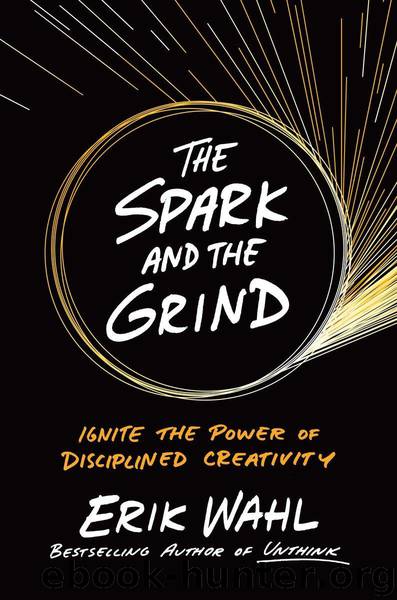The Spark and the Grind by Erik Wahl

Author:Erik Wahl
Language: eng
Format: mobi, epub
Publisher: Penguin Publishing Group
Published: 2017-01-24T11:39:02+00:00
In Daily Rituals, Mason Currey illustrates that there’s little similarity between someone like French novelist Gustave Flaubert—a night owl who woke daily at 10:00 A.M. and banged on the ceiling to summon his mom for a chat—and the Swiss-French architect Le Corbusier, who shot up at 6:00 A.M. for forty-five minutes of exercise. “But they each did what they did with iron regularity,” writes Oliver Burkeman of The Guardian. In his review of Currey’s book, he references W. H. Auden’s advice that creators must “Decide what you want or ought to do with the day, then always do it at exactly the same moment every day.” Auden’s reason? So that “passion will give you no trouble.”
Immanuel Kant’s neighbors, writes Burkeman, could set their clocks by his daily routine. While this seems like an “intimidating level of self-discipline,” Burkeman rightly calls it a “safety net.” However, this kind of safety isn’t the security that we traditionally seek from a job or a large sum in the bank. It’s the sort of safety that we feel when we know we’re doing precisely what we need to be doing in order to both personalize and maximize our creative capacity.
All routine requires risk, especially at the outset. There’s no way around it. So strap in when you’re trying to establish yours. It won’t feel efficient at first—much like my efforts to paint on a black canvas. When you begin, you’re often in the dark about the outcome. You might feel the emotions one feels in the dark, both bad and good: impatience, confusion, frustration . . . hope, excitement, wonder. Stick it out. As your mind, body, and spirit conform to the regularity of a routine, certain things that once took effort become involuntary.
The psychologist and philosopher William James claimed that by making as many aspects of our lives as automatic as possible, we could “free our minds to advance to really interesting fields of action.” When he said this in the late 1800s, there was little to prove the assertion. Today, as journalist Daniel Coyle points out in his book The Talent Code, scientists now believe that each time we perform a task, the specific neurons that fired to make the task possible grow a layer of fatty tissue around them called myelin, which serves as an insulator so these same neurons can fire more efficiently the next time they’re needed. Essentially, this means that the more you repeat the same activity, the more its specific neurons are insulated, the more efficient and automatic the activity becomes.
Since the 1980s we’ve gone round and round about whether having too much on our minds is good or bad for us but there is one thing most experts can agree on: the more activities we can automate and carry out by habit, the freer our minds are to accommodate and properly filter the new ideas and information constantly swirling around us. This is why, when he was in office, President Barak Obama routinely wore suits in the same two colors.
Download
This site does not store any files on its server. We only index and link to content provided by other sites. Please contact the content providers to delete copyright contents if any and email us, we'll remove relevant links or contents immediately.
Tools of Titans by Timothy Ferriss(8363)
Change Your Questions, Change Your Life by Marilee Adams(7753)
Deep Work by Cal Newport(7059)
Playing to Win_ How Strategy Really Works by A.G. Lafley & Roger L. Martin(6218)
Man-made Catastrophes and Risk Information Concealment by Dmitry Chernov & Didier Sornette(6001)
Big Magic: Creative Living Beyond Fear by Elizabeth Gilbert(5753)
Digital Minimalism by Cal Newport;(5747)
Ego Is the Enemy by Ryan Holiday(5412)
The Slight Edge by Jeff Olson(5408)
The Motivation Myth by Jeff Haden(5202)
The Laws of Human Nature by Robert Greene(5169)
Stone's Rules by Roger Stone(5080)
Tuesdays with Morrie by Mitch Albom(4767)
Eat That Frog! by Brian Tracy(4518)
Rising Strong by Brene Brown(4448)
Skin in the Game by Nassim Nicholas Taleb(4235)
The Money Culture by Michael Lewis(4196)
Bullshit Jobs by David Graeber(4177)
Skin in the Game: Hidden Asymmetries in Daily Life by Nassim Nicholas Taleb(3987)
